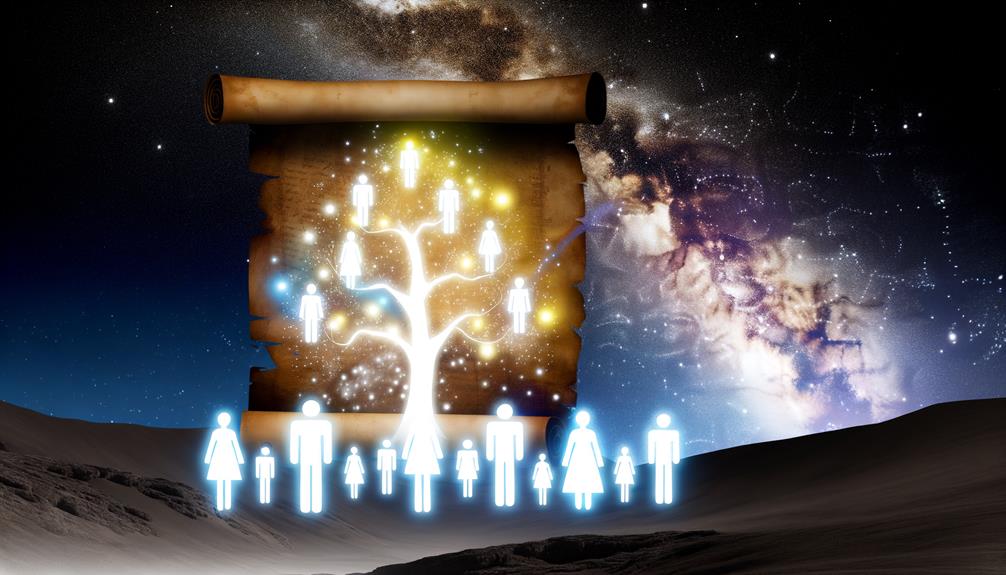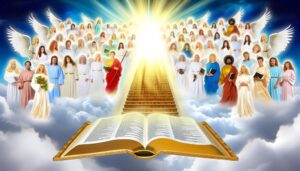Meaning of Sons of God in the Bible: Divine Connection
The term ‘Sons of God‘ in the Bible holds multifaceted meanings, varying by context. In the Old Scripture, it often refers to divine beings or angels, as seen in Genesis 6:2-4 and Job 1:6.
Some interpretations also identify these as the righteous descendants of Seth. In the New Scripture, ‘Sons of God’ signifies believers adopted into God’s family through faith in Christ, with passages like Romans 8:15-17 illustrating this spiritual relationship.
Understanding these differing applications highlights the complexity and richness of biblical theology, offering deeper insights into its divine and human dimensions. Continuing this exploration reveals further theological nuances.

Meaning of Sons of God in the Bible: Understanding Divine Beings and Their Role
| Aspect | Meaning |
|---|---|
| Old Testament Reference | In Genesis 6:1-4, the “Sons of God” are often interpreted as divine beings or angels who took human wives, leading to the birth of the Nephilim. |
| New Testament Reference | In the New Testament, “Sons of God” refers to believers in Christ who are adopted into God’s family, as seen in Romans 8:14-17. |
| Spiritual Significance (OT) | In the Old Testament, “Sons of God” may refer to angelic beings or beings with a close relationship to God, highlighting the divine hierarchy. |
| Spiritual Significance (NT) | In the New Testament, “Sons of God” symbolizes the spiritual adoption of believers through faith in Jesus Christ, granting them eternal life. |
| Theological Interpretations | The term has been interpreted in various ways, ranging from angelic beings to faithful human followers who reflect God’s character. |
| Role in Salvation | In the New Testament, believers as “Sons of God” are heirs to God’s kingdom, chosen to live in righteousness and inherit eternal life. |
| Key Bible Verses | Genesis 6:2 (The “Sons of God” and the Nephilim); John 1:12 (Those who receive Christ are given the right to become “Sons of God”); Romans 8:14 (Led by the Spirit, they are “Sons of God”). |
Old Testament Appearances

Examining the Old Scripture appearances of the term ‘sons of God‘ reveals its usage in various contexts, such as divine beings, angelic entities, and the descendants of Seth.
In Genesis 6:2-4, the term is often interpreted as referring to angelic beings who cohabited with human women, producing the Nephilim. Job 1:6 and 2:1 depict ‘sons of God’ as celestial beings presenting themselves before the Lord.
Conversely, in the context of Genesis 4:26, the descendants of Seth, who began calling upon the name of the Lord, are also referred to as ‘sons of God,’ symbolizing a righteous lineage distinct from the wicked descendants of Cain.
Therefore, the term encapsulates a spectrum of beings aligned with divine purpose.
New Testament Context

In the New Covenant, the term ‘sons of God’ primarily signifies those who are adopted into God’s family through faith in Jesus Christ, as evidenced in passages such as John 1:12 and Romans 8:14-17. This New Scripture context enriches the understanding of divine filiation by highlighting:
- Adoption: Believers are not naturally born but are spiritually adopted into God’s family (Ephesians 1:5).
- Inheritance: As sons, believers become heirs of God and co-heirs with Christ (Romans 8:17).
- Transformation: The indwelling Holy Spirit transforms believers, affirming their status as God’s children (Galatians 4:6).
- Intimacy: Believers enjoy a profound relationship with God, calling Him ‘Abba, Father’ (Romans 8:15).
These elements collectively articulate the theological depth of being ‘sons of God’ in the New Scripture.
Hebrew Terminology

The Hebrew term ‘bene Elohim,’ often translated as ‘sons of God,’ appears in various Old Scriptures passages and carries nuanced meanings that contribute greatly to biblical theology. The phrase is seen in texts such as Genesis 6:2 and Job 1:6, where it signifies beings with a special relationship to the divine.
Linguistically, ‘bene’ translates to ‘sons,’ and ‘Elohim’ is a plural word often used to denote God or gods, depending on context. This term underscores the multifaceted nature of divine-human interactions within Hebrew scripture.
Understanding ‘bene Elohim’ requires a deep engagement with the original Hebrew language, enabling a richer grasp of the theological and cosmological constructs that underlie the biblical narrative.
Angelic Beings

Understanding ‘bene Elohim’ in its Hebrew context naturally leads to an examination of angelic beings, as these celestial entities are often identified as the ‘sons of God’ in biblical literature.
Scriptural texts provide insights into their nature and function, emphasizing their divine origin and roles. Key biblical references include:
- Job 1:6 – Depicts ‘sons of God’ presenting themselves before Yahweh, suggesting a heavenly council.
- Genesis 6:2 – Describes ‘sons of God’ interacting with human women, indicating their distinct existence.
- Psalm 29:1 – Calls ‘sons of God’ to ascribe glory to the Lord, highlighting their worship-oriented roles.
- Daniel 3:25 – Refers to a divine figure resembling a ‘son of God’ in the fiery furnace, illustrating protection and presence.
These references collectively enhance our understanding of angelic beings within biblical theology.
Fallen Entities

When addressing the concept of fallen entities, it is imperative to recognize their significant divergence from their original divine purpose as depicted in various scriptural narratives.
These beings, often identified as “sons of God” in texts like Genesis 6:1-4, abandoned their celestial roles, leading to moral corruption.
Jude 1:6 and 2 Peter 2:4 further elucidate their rebellion, depicting their expulsion from divine presence.
Theologically, these texts underscore the gravity of their transgression and its ramifications on earthly matters, reinforcing the dichotomy between divine intention and disobedience.
Their fall serves as a cautionary exemplar within the biblical corpus, illustrating the severe consequences of straying from ordained paths and the enduring impact of such spiritual defection.
Human Lineage

Within the broader narrative of the Bible, human lineage plays a vital role in illustrating the fulfillment of divine promises and the unfolding of God’s redemptive plan. The genealogical records meticulously trace the descent of key biblical figures, emphasizing the importance of lineage in the divine narrative.
- Adam and Eve: Their lineage sets the stage for humanity’s story, introducing sin and the need for redemption.
- Noah: His descendants repopulate the earth post-flood, symbolizing a renewed covenant with God.
- Abraham: His lineage is essential, as it carries the promise of blessing all nations through his seed.
- David: His line is significant for the prophetic promise of the Messiah, culminating in Jesus Christ.
These lineages underscore God’s faithfulness in history.
Divine Inheritance

Divine inheritance in the Bible refers to the spiritual and eternal blessings bestowed upon the faithful as a result of their relationship with God and their identity as His children.
This concept is intricately woven through scripture, with key passages such as Romans 8:17, which states, ‘if children, then heirs—heirs of God and co-heirs with Christ.’
This inheritance encompasses the promise of eternal life, adoption into God’s family, and access to divine wisdom and grace.
Theological analysis reveals that such inheritance is not merely futuristic but includes present spiritual empowerment.
Ephesians 1:11 underscores this by affirming, ‘In Him we were also chosen…according to the plan of Him who works out everything in conformity with the purpose of His will.’
Historical Perspectives

Throughout history, the term ‘sons of God’ in the Bible has been subject to various interpretations, reflecting diverse theological, cultural, and exegetical perspectives. Scholars have identified several historical viewpoints:
- Ancient Near Eastern Context: This perspective considers the term ‘sons of God’ as referring to divine beings or lesser deities, aligning with polytheistic traditions.
- Jewish Tradition: In pre-Christian Jewish texts, ‘sons of God’ often denotes angels or divine messengers.
- Early Christianity: Early Christian writers interpreted ‘sons of God’ as referring to both angels and the faithful followers of Christ.
- Medieval Exegesis: Medieval scholars expanded the term to include saints and virtuous individuals, reflecting a broader spiritual kinship.
These perspectives underscore the term’s complex historical evolution.
Theological Interpretations

Theological interpretations of the ‘Sons of God’ in biblical literature often oscillate between two primary theories: the Divine Beings Debate and the Human Lineage Theory.
Proponents of the Divine Beings Debate posit that these figures represent celestial entities or angels, drawing support from passages such as Job 1:6 and Psalm 29:1.
Conversely, the Human Lineage Theory suggests these references denote the godly descendants of Seth, interpreting Genesis 6:2 in a manner that emphasizes a covenantal lineage.
Divine Beings Debate
Interpreting the term ‘Sons of God’ in biblical scripture has led to a spectrum of theological debates that hinge upon varying conceptions of divine beings within ancient and contemporary frameworks. Scholars propose several interpretations:
- Angelic Beings: Some view the ‘Sons of God’ as divine or semi-divine beings, angels who interacted with humanity.
- Deities of Polytheistic Cultures: Others suggest these references may align with surrounding polytheistic traditions, where multiple gods were acknowledged.
- Divine Council Members: Another interpretation posits these beings as part of a divine council, reflecting ancient Near Eastern beliefs in a pantheon under a supreme deity.
- Mythological Figures: Finally, some argue these beings are mythological figures, symbolizing the interaction between the divine and mortal domains.
These interpretations underscore the complexity of biblical exegesis and the richness of theological inquiry.
Human Lineage Theory
The Human Lineage Theory posits that the term ‘Sons of God‘ refers to descendants of a divinely appointed lineage, often identified as the godly line of Seth. This interpretation is rooted in the genealogical accounts in Genesis, where Seth’s descendants are portrayed as maintaining fidelity to God.
Proponents of this theory argue that the ‘Sons of God’ were distinct from the ‘daughters of men,’ who represented the ungodly line of Cain. The merging of these two lineages, as depicted in Genesis 6:1-4, is seen as a pivotal moment leading to widespread moral decay and the subsequent divine judgment of the Flood.
Theologically, this interpretation underscores the importance of spiritual lineage and covenantal faithfulness in biblical narrative.
Scholarly Debates

Scholarly debates on the meaning of ‘Sons of God‘ in the Bible often pivot on interpretive historical contexts, with some scholars emphasizing ancient Near Eastern parallels.
Divergent theological perspectives further complicate consensus, leading to varied understandings among Jewish, Christian, and other religious traditions.
Additionally, linguistic analysis reveals significant variations in the translation and interpretation of key Hebrew and Greek terms, which influence doctrinal conclusions.
Interpretive Historical Contexts
While the phrase ‘Sons of God’ appears in various scriptural contexts, its interpretation has sparked considerable scholarly debate, reflecting diverse theological perspectives and historical understandings.
Examining these contexts reveals four primary interpretive lenses:
- Ancient Near Eastern Context: Some scholars assert that the term aligns with divine council motifs, where ‘Sons of God’ are viewed as divine beings or lesser gods.
- Second Temple Judaism: This period often identified ‘Sons of God’ with angelic beings, deeply influencing early Christian thought.
- Early Christian Writings: Interpretations shifted towards viewing ‘Sons of God’ as righteous humans or followers of Christ.
- Modern Exegesis: Contemporary scholars debate between traditional views and novel interpretations, considering historical-critical methods and linguistic analysis.
These contexts provide a multifaceted understanding essential for theological exploration.
Theological Perspectives Divergence
Diverging theological perspectives on the ‘Sons of God’ in the Bible necessitate an analysis of historical, cultural, and linguistic nuances to uncover the multifaceted dimensions of this phrase. Various scholarly debates focus on whether the term refers to angelic beings, divine council members, or righteous descendants of Seth. These interpretations hinge on contextual readings of key biblical texts, such as Genesis 6:1-4 and Job 1:6.
| Perspective | Key Proponents |
|---|---|
| Angelic Beings | Early Jewish Literature, Enoch |
| Divine Council Members | Some Ancient Near Eastern Scholars |
| Righteous Descendants of Seth | Augustine, Early Church Fathers |
This divergence demonstrates the complexity and depth of scriptural exegesis, requiring meticulous theological inquiry.
Linguistic Analysis Variations
The interpretation of the phrase ‘Sons of God’ in biblical texts involves a complex linguistic analysis that reveals significant scholarly debates over its precise meaning and implications. Scholars have examined:
- Hebrew Terms: The original Hebrew phrase ‘בְנ\u05die הָאֱלֹהִים’ (b’nei ha’Elohim) which can be translated to mean ‘sons of the gods’ or ‘sons of God’.
- Contextual Usage: Variations in how this phrase is used in different biblical contexts—Genesis 6:2, Job 1:6, and Psalm 29:1.
- Septuagint Influence: The Greek translation of the Hebrew Bible (Septuagint) and its rendering of the term.
- Second Temple Literature: Interpretations found in extra-biblical texts, such as those from the Dead Sea Scrolls and other Second Temple period writings.
Each of these points contributes to ongoing debates within theological scholarship.
Modern Implications

In examining the modern implications of the term ‘Sons of God‘ within contemporary Christian theology, it is essential to contemplate both the historical context and its evolving interpretation in today’s faith communities.
Historically, ‘Sons of God’ has been understood variably as angelic beings, Israel as God’s chosen people, or believers in Christ.
Today, the term is often interpreted through the lens of New Scriptures teachings, particularly in relation to the believer’s adoption as children of God (Romans 8:14-17).
This theological framework emphasizes the intimate relationship between God and believers, underscoring spiritual inheritance and divine kinship.
Such an interpretation fosters a sense of belonging and identity, encouraging ethical living and spiritual growth within the Christian community.
Conclusion
In a most delightful twist of divine comedy, it appears that the ‘sons of God‘ serve as a theological Rorschach test, perpetually inviting scholars to project their interpretive whims upon them.
Whether angelic beings, fallen entities, or mere mortals, one thing remains certain: the phrase is a most versatile vessel, accommodating an array of doctrinal cargo.
Consequently, the quest for definitive clarity in this matter remains as elusive as the very beings under scrutiny.






